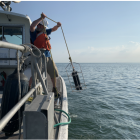
By Mia Litzenberg
The Six Nations of the Grand River face ongoing water insecurity from pollution, climate change and corporate extraction. Many years of Indigenous water advocacy have led to the development of a new Haudenosaunee Environmental Research Institute as the next step to overcome these challenges.

By Ada Tussing
If you’ve noticed fewer birds in the sky recently, they haven’t all flown south for the winter. The North American bird population has dropped nearly 30% in the last 50 years. Mariette Nowak’s book “Birdscaping for Wisconsin and the Great Lakes Region” offers a solution: birdscaping.

A new study examines the uniqueness of work that research centers conduct in the Great Lakes region, highlighting their importance amid dramatic changes in federal funding.

By Bauyrzhan Zhaxylykov
New U-M survey finds only about 5% of rural Michigan residents say they would choose an electric vehicle as their next car. Researchers attribute much of that reluctance to misinformation about the availability of public chargers and the cost of EVs and replacement batteries. The Whitmer administration is pushing to expand electric vehicle use to meet climate and clean energy goals.
More Headlines



